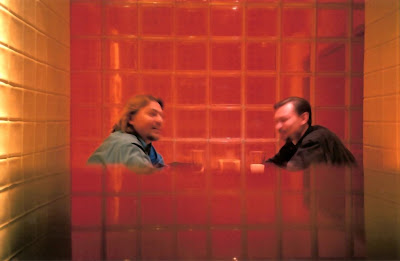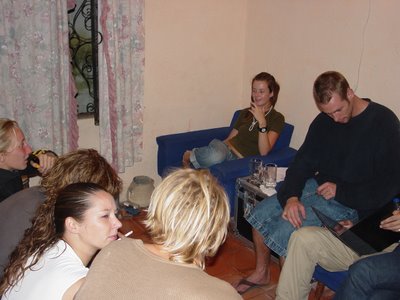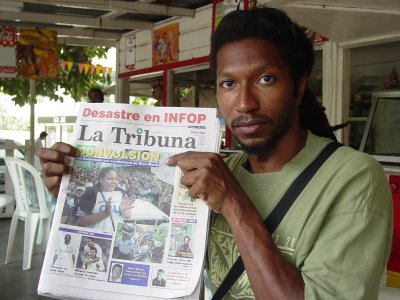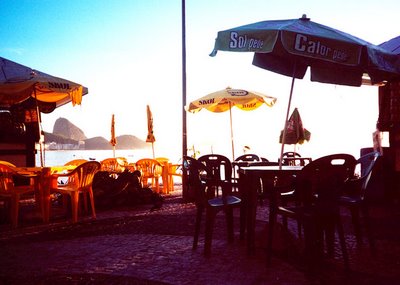Hotel Yang, Part 2
In
Hotel Yang, Part 1, I described a couple of favorite hotels and the tales associated with them, and it was probably obvious that the dodgier and weirder the lodgings, the more fondly I remember them. Perhaps when I get older I’ll return from a trip and report that I made all my flights and connections, was admitted without hassle into all the clubs, was greeted by name at all my hotels by obsequious concierges offering chocolate and cheek kisses, and I’ll actually be pleased about it. But if that’s what I wanted I’d just go to Club Med with the rest of the squares.

In the pantheon of yang hotels, my second runner-up is the
Tortuga Surf Lodge, near the coastal village of Playa el Tunco, El Salvador (pictured). The first time I went was at the behest of my girlfriend Diana, who had booked this hotel blind, without a photo for reference, and with only a vague notion where the place was. "On the beach, south of town," she assured me.
We bused from San Salvador to the seaside city of Libertad and explored there briefly, shopping in vain for non-kitschy souvenirs and taking in the local color. When a woman lurking in a shabby corner of the central market offered to sell us an infant we decided it was time to go. We rode a second bus to a country crossroads, disembarked and set out afoot in the direction that looked most likely to lead to the coast. Soon we were trekking through stifling woods patrolled by emaciated mongrel dogs. We glimpsed an occasional stick shack sagging amidst the trees, but encountered no people save for a lone rummy who shambled out from the shadows and followed us, entreating us to join him for a drink.
I rarely worry. In fact, it’s only happened twice during my travels, both times in Guatemala: once was the time a friend and I wandered into a secluded town on the slopes of Volcán Agua and found ourselves facing an angry mob that had just finished killing a man; the other time was when the same friend asked me accompany him while he delivered eight-thousand dollars in cash to people in the worst zone of Guatemala City. So I wasn’t worried about a walk in the woods. But since I like to know what to expect, I asked Diana, who had planned this excursion and was more experienced than I at wandering the Salvadoran sticks, to confirm that none of this—dark woods, reeking drunk, evil dogs—was odd.
I believe I said, “Just to check, you do this sort of thing all the time, right? I mean, you aren’t wandering out here just because I’m with you, are you?”
She stared. “Oh no, I’d never be out here without you.”
Great.
So I charged up my radar but picked up no blips. We seemed safe—even the drunk had stopped following us, which I hoped was a good sign.
A little while later we happened upon a man standing at the edge of the woods. What was he doing there? Nothing—you do a lot of nothing when you’re poor and jobless. This is true from Seattle to Barcelona to Rio. We asked for directions. You’re thinking, I imagine, that it’s a terrible idea to admit being lost to a stranger in an extremely dangerous foreign country. Well, you’re right. You’re thinking it’s like presenting yourself on a platter to be carved up like an Easter roast. Yes, it is, and things like that happen all the time—two people had been found decapitated in the woods near Diana’s village months earlier. But you’re either comfortable taking these kinds of risks or you aren’t.
The man did more than just give us directions—he ushered us down the road, into more woods, down a hill, up a hill, and it became clear that, assuming he was leading us to the hotel rather than to be slaughtered in the wilderness, we’d have never located it on our own. Eventually he led us through a crumbling wall, and we found ourselves outside a compound surrounded by a fence topped with concertina wire. The man knocked and a gate opened onto the Tortuga Surf Lodge, which was the smallest hotel I’d ever seen—a four-room house that sat beneath palm trees on a black sand beach about fifty feet from the ocean.
We thanked our friend and he departed with a wave, perhaps headed back to his outpost beside the woods. In life you intersect orbits with countless people and they fade into oblivion, but it’s always interesting which faces stay with you and which acts of kindness you remember. I like to think our guide is still standing there in the heat, aide to lost travelers, eternal as a sphinx, elemental.

Back then the Tortuga Surf Lodge (it's since been expanded and remodeled) had no check-in, no desk, no formalities of any sort. A security guard—perhaps eighteen years old and dressed in shorts and a tank top—gave us a key and that was that. We were the only guests. After we dropped our packs in the room we walked a few hundred yards down the beach to the town of Playa el Tunco proper. It straddled a creek mouth and consisted of maybe twenty residences and a restaurant. Cows stood on the shore drinking seawater. Roosters wandered the sands. The restaurant was empty, but a group of men stood sentinel out front blasting bass-heavy salsa music from a tricked-out Ford truck. As I approached they all turned to gawk.
This is probably the third or fourth time I’ve made reference in a post to people staring, and you may be thinking that there is nothing strange about black guys with dreadlocks. I happen to agree, but in certain parts of the world my appearance is considered unusual. My hair is about two feet long, which certainly has something to do with it. Also, El Salvador has very few blacks. This is not by accident—blacks were turned away at ports and border crossings until well into the twentieth century. And it’s safe to say that many Salvadorans have negative attitudes about blacks, though very few of them have actually met any. The mythology is passed on anecdotally: “I heard about a black who _______” Insert evil deed of choice.
But as I have mentioned before, for some reason foreigners think the best of me. I don’t know why. In El Salvador, particularly, I am often assumed to be a famous soccer player (though I have yet to see any footballers with two feet of dreadlocks). I’ve had strangers rush up to shake my hand. In Playa el Tunco, as I walked into the only restaurant in the village, past the men who were gathered outside, the salsa music stopped mid-chorus. In the silence Diana and I took a table. A waitress peeked around a corner and vanished. I was aware of activity near the pick-up, and had a pretty good idea what was coming.
And then it happened: as loud as you can possibly imagine, Bob Marley’s “Could You Be Loved” boomed from the truck. The men cheered and waved at me. They toasted me with beers. I don’t fully understand nor can I explain this reaction, but it happens everywhere I go.

Diana and I ate seafood and drank Coronas and the Marley just kept on coming. “Redemption Song”, “No Woman No Cry”, “War”, and our friends knew all the words. It’s an episode I’ll always remember. But time marched on and, because the Salvadoran night is owned by armed gangs, we headed back to the lodge before sunset. By the time dark fell the building was quiet as a tomb. The guard began his all-night patrol of the property, equipped with a flashlight, a rottweiler and a .38-caliber automatic pistol. He’d told us earlier that if not for his presence the gangs would simply climb the walls and wreck the place. Certainly anyone staying there at the time would be in deep trouble. He was surprisingly cheerful for a guy who had standing orders to shoot to kill. His flashlight beam playing among the trees all night was as comforting as firefly beacons, and Diana and I slept securely.
The next morning the guard appeared at our door holding his shoulder, which looked bruised and misshapen. I deduced from this visual cue (and the fact that he was weeping), that he had suffered a dislocation. He confirmed this himself when he said he’d been bodysurfing and a wave had slammed him face first into the shore. He begged me to put his shoulder back in the socket. I’ve seen this scene in a few movies and it didn’t look pleasant. Still, I would have tried save that I remembered something a doctor once told me—a shoulder dislocation looks very much like a shoulder break to the untrained eye, but a break leaves two jagged bone ends near the circumflex humeral artery, which supplies the arm. Jockeying these bones around is an easy way to lacerate the artery, which, of course, would result in the person bleeding to death rather quickly. So I told him no—but I gave him some Advil.
The guard said that, since I had refused, he had an acquaintance who could reset his shoulder. But because he didn’t want to embarrass a friend at work, he waited in pain for several hours. When he finally left, he took the flashlight, the rottweiler, the gun—and left the gate to the property wide open. The pain had obviously disoriented him. Or else he was angry about the Advil. Diana and I locked ourselves in our room, knowing full well the thin doors wouldn’t do much good against armed gangsters. When we heard noises on the property an hour later we assumed the worst, but it turned out our guard had not forgotten his duty after all—he’d sent his rickety old grandpa to guard us until he returned.

The idea of being protected by this oldster was comical, for sure. He would have fluttered away like rice paper if a stiff wind had come up. But he had the keys and was able to lock the gate, which meant no marauding gangsters invaded the property and I survived to get into even stickier situations elsewhere in the world. The guard survived as well. He’s pictured above, the day after his mishap, looking pretty happy considering his arm is in a sling. He said the Advil actually helped with the pain, so consider that a real-life product endorsement. As for the Tortuga Surf Lodge, it receives a rating of four yangs—good for third place on my all time list. There are no amenities, and concertina wire detracts somewhat from the ocean view, but it’s the real El Salvador, and there's no price you can put upon that.
I'll continue this series in Hotel Yang, Part 3, to be posted soon.
Cosmo Overheats

In much the same way Cosmo Kramer used to burst through Jerry Seinfeld’s apartment door, Michael Richards has burst back onto the American cultural scene, materializing from post-superstar obscurity to make a Thanksgiving turkey of himself at Hollywood’s Laugh Factory by hurling ethnic slurs at audience members who heckled him. In the wake of his already infamous outburst, 99% of the punditry devoted to it is so wildly offmark it instills in intelligent people a deep fear for the state of the American IQ. Most reprehensible among the 40-watt intellects coming to Richards’ defense are those who want to blame the audience members who heckled him and supposedly incited his outburst.
The theory that Richards was incited is utter nonsense. Michael Richards is a comedian, and he's supposed to get heckled. That's right—it’s his job. I've rarely been to a comedy show where a comic didn't have to fire back at an audience member. When this happens it is considered to be in fun, and the comic’s job is to construct clever and funny retorts fittingly indicative of his/her improvisational skill, at which point the audience laughs and the show goes on. Most times, when the comic gets in a zinger the heckler laughs too, because he knows being bested is the price he pays for mouthing off. This interchange is part of the profession, like clouds are part of the atmosphere, and waves are part of the ocean. It is something all comics learn in Stage Comedy 101, and the suggestion that heckling warrants a racist outburst is like saying a drizzle warrants a Domino’s driver dumping your pizza on the curb.
What Richards did—explode because an audience behaved the way audiences are programmed to behave—is the comedic equivalent of going postal, and like someone who goes postal, it simply means he can’t handle his job. This happens all the time to people in all walks of life. For this failing, blame Michael Richards, or, if you like, blame his job, but those who are blaming the audience members—disingenuously pretending old Kramer was some guy on the street ambushed while minding his own business, rather than a professional with a job to do—are simply revealing ugly sides of themselves not very different from the half-human monster revealed by Richards.
Hotel Yang, Part 1
One thing about traveling is that, unless you’re rich and stay at 5-star hotels everywhere you go, improvisation is needed. Over the years I’ve slept in more hotels than I can count, and while those on the yin side of the balance—the Rihga Royal in New York City, the Meridien in St. Maarten, and la Bobadilla in the south of Spain—have been excellent, those on the yang side have been horrific. El Salvador, in particular, has been the site of many memorable incidents in hotel history. The country is, I always like to say, the world capital of everything that is fucked-up. Which means, of course, that I'm drawn to it à la moth to flame. On these trips—ten to date—the one guarantee is that nothing will go quite according to plan.

A few years ago at a budget hotel in San Salvador—optimistically called the Happy House—I checked into my first-floor room and noticed a hole in the wall. Hard to miss, really. It was rectangular, maybe two feet wide by a foot and a half high, and easily large enough for various forms of Central American fauna—including humans—to crawl through. I was tired, and not really up to switching rooms, simply because in Central America these kinds of glitches usually require a debater’s persuasiveness and superhuman bartering skills to overcome, but I asked myself: What are the odds a passing murderer will enter my room and gut me while I’m sleeping? Since I’d already met a wandering
murderer on those same streets during an earlier trip, I decided the odds were slightly better than busting in blackjack by hitting a soft fifteen. Which is to say, pretty good.
When I returned to the desk the clerk saw me coming and looked nonplussed, at best. He knew I could only be out there to complain about something and had clearly decided long ago that gringos were just impossible to please. His disinterest was so palpable, and was so plainly the result of having dealt with innumerable prima donnas in his day, that if I had been guesting on the Happy House sitcom this is the point at which snickers would have begun swelling on the laugh track as the audience anticipated the punchline of a running gag. His tagline response to my complaint might have been something like: “Ay chihuahua! What do you think this is, the Ritz?”
But I explained with an aplomb equal to his that there was a real problem with the room, not just some roach carcasses or a broken sanitary seal on the toilet, rather something muy serio that required official intervention. Reluctantly, he followed me and I indicated the room with a conjurer’s wave. His reaction was the only honest-to-God double-take I’ve ever seen. His gaze passed unseeing over the hole and came to rest on me with an expression like “And?” Then his head whipped back so fast I thought his neck muscles were rubberized. He cried out, “Ay dios, alguien ha robado el acondicionador.”
Oh God, someone has stolen the air conditioner.
Seems some enterprising soul had walked up to the hotel and pried it right out of the wall. The audacity of such an act is matched only by its ingenuity. But necessity is, after all, the mother of invention, and fifteen minutes of Salvadoran heat is probably enough to push anyone to the brink of air conditioner theft. I forged a love/hate relationship with the Happy House that day, and I sleep there every time I go back to San Salvador. This beloved hotel features in an even stranger story—one involving dogs and the same jaded clerk—but I’ll save that for part two. However, the hole in the wall bit does bring to mind another favorite hotel with strange architectural features, this one in St. Petersburg, Russia.

The hotel is called the Okhtinskaya-Victoria and is situated on the Neva River close to the Bolsheokhtinsky Bridge and the Smolny Cathedral. Never have I passed the night at a place that seemed so apt a setting for a horror movie massacre. I could only surmise it was haunted by Cold War ghosts, like a Soviet version of Stephen King’s Overlook from the Shining. It sometimes seemed as if there were no guests, so eerily empty was this giant structure, with its often deserted desk, always vacant dining room, and hallways that seemed to recede into the distance like in a zoom take from Vertigo. The guests I did see stared at me as if I’d escaped from an exhibit at the Leningrad Zoo. For this I don’t blame them—sometimes I look in the mirror and think the same thing.
Perhaps the eeriest feature of the Okhtinskaya was its rooms, which contained wall-mounted radios that I believe were tuned to interdimensional frequencies. These devices, which looked like concept radios made for a 1950 “Designing for the Future” expo, broadcast only sibilant voices, yet so faintly as to be at the very furthest edge of human perception. Not once did a note of music issue from these things, nor news broadcasts, nor anything that could be construed as a commercial—just bizarre Lovecraftian whispers, unchanged no matter if buttons were pushed or the dial was spun. And though the voices formed phrases that seemed at least superficially Russian, they never came through clear enough for me to be sure.

The ingredients were ripe for my disappearance from the face of the Earth. Far away country with an impenetrable bureaucracy? Check. Last minute alteration to itinerary that renders my exact whereabouts a mystery? Check. Empty hotel with few potential witnesses to my abduction? Double-check. And lastly, bad karma from eating a bunny rabbit at dinner? Check-o-lutely. Luckily, I’ve learned at times like this to rein back my (perhaps overactive) imagination by reminding myself that I am a mere insignificance, as value is generally calculated, and if I were rendered to my base elements I’d sell on eBay for three fiddy—before shipping.
Yes!
It’s liberating to be unimportant. And in this case it meant I was safe to continue my travels and stay in even more dodgy hotels, some of which I'll discuss in a later post.
Texas Hold ’em Hostage
I have to say, non-existent readers, that when I conceived my little tagline “becoming a citizen of the world” it was my intention to post about international events and write silly travel stories, all from a black point of


view and with an emphasis on places I’ve visited or lived. But Stateside news items have been incomparably bizarre of late, so while I promise to discuss the preferred technique for drinking absinthe, the best city in which to buy bear liver paté, and everything you need to know to survive Rio's carnival, all those subjects come later. Today we're going to Texas.
Yee-Haw!
Lone star governor Rick Perry has launched a unique anti-illegal immigration program which consists of installing numerous webcams along the Texas/Mexico border, all linked to an interactive website which ordinary citizens can access in order to act as virtual border agents. From a private home any concerned civilian can log into
texasborderwatch.com, sign up, access a webcam feed, and keep a vigilant eye peeled for sneaky migrants. In the event of suspicious activity they can e-mail the border patrol in Austin, at which point agents log and possibly investigate the sighting. This program is slated to cost approximately five million dollars.
The easiest way to get people to shut down their logic circuits is by appealing to their racial fears. It’s a time-honored technique perfected by a bunch of dead guys with umlauts over their names. While a plan to stem the tide of illegal immigration through south Texas is certainly within Rick Perry’s scope of duties as governor, I suspect that if people weren’t gripped by ethnic panic they’d wonder—as I do—how in the hell a program to install approximately one hundred webcams costs five million dollars. The entire website was built for
$100,000 by Tactical Resource Gear Emergency Management Solutions of Plano, TX. Webcams to feed the site aren’t expensive. Even solar powered, night-vision equipped cams are less than $1,500. Servers, software, and techs to maintain the system shouldn’t cost even half a million dollars, let alone five. Where is the rest of this money going?


I believe it's possible Texas voters are being fleeced, and all the while Rick Perry gets to posture as if he’s doing something concrete about illegal immigration. Here’s the most concrete thing Texans can do: demand an itemized accounting of where the five million dollars is going. Then, with the list of service providers in hand, see how many of those businesses are owned, chaired or operated by Perry’s poker buddies. They might find that this hopeless scheme was hatched during a late-night game of Texas Hold ’em, and what’s really being held (hostage) is their tax money.
In addition to looking, walking and quacking like a boondoggle, Perry’s plan is a textbook example of the political tenet: Show the public you’re doing something even if what you’re doing is a farce. It’s very much like confiscating nail clippers before commercial airline flights. Nail clippers possess less potential for harm than a spiked heel or a good left jab, but banning them from flights is supposed to show travelers that nothing is too small to escape the notice of airline security. Here we have the same illusion in effect. Rick Perry is trying to dazzle south Texas taxpayers with the idea of virtual border security even as illegal immigrants continue to find the physical border wide open.
But I shouldn’t label Perry’s webcam flimflam a political fake without at least attempting to consider it as if its stated goals are real, so let’s examine it as a serious attempt to plug up the border. As such, the obvious technical flaw is that the smugglers who guide illegal immigrants—they are called coyotes in the American press but refer to themselves as polleros—can simply pull up the web feed on their own computers and map which areas to avoid. The secondary but no less serious flaw is that opponents to the plan can submit false sightings. It leaves the border patrol vulnerable to manipulation by both polleros and political enemies. The border patrol, incidentally, are also part of the U.S. drug interdiction effort, which means they may find themselves subject to the whims of drug lords as well.


The whole scheme brings to mind an occasion when I attended a technological seminar devoted to combating electronic piracy. The keynote speaker said something that always stuck with me: "When people construct a security system they usually think that building something 90 percent effective stops 90 percent of criminals. That’s like building a house and putting bars on every door and window except the one in the back leading to the basement. The bars don’t stop 90 percent of criminals—90 percent of criminals find the basement window and go through that." Rick Perry’s plan won't stop five million dollars worth of illegal immigration. It will at best redirect it.
I accessed texasborderwatch.com myself and, after downloading software to make it viewable, had a peek at the video feeds. I couldn't capture the images (or maybe I was too lazy to do it) so pictured in this post are samples from
punkassblog.com, but they're accurate representations of what I saw. If You Tube looked this bad it would never have sold for a billion and a half dollars. When I finally did see something a thought came to mind: Am I seeing illegal immigrants or people out there for another reason? The website has a
link answering the question of what, exactly, to report. Their explanation is about as clear as Rio Grande floodwater. The idea of possibly e-mailing a false report brought up the question of who would filter these out, and how. It also made me wonder how they would determine an accidental false report from an intentional one. Intentionally falsifying a report to law enforcement is a crime, but who, exactly, is going to come for me and are they willing to chase me down in, say, Mexico City or Amsterdam?
Truly, I understand the concerns Texans have about illegal immigration. A version of their concern exists from Sweden to Germany to Australia. More than a dozen trips through Texas have taught me exactly how annoyed folks there get when strangers troop through their ranchland. Can you blame them? Conversely, numerous stints in Mexico have likewise taught me how desperately illegal immigrants crave a better life for themselves and their families. Nothing will deter them in their quest for what many say—and I agree—is a basic human right. Would anything deter you? I think progress on the issue can only be made when the debate is reframed in two ways—first, so that it focuses on illegal employers rather than illegal immigrants, and second, so that it focuses on free trade policies that drive Mexican wages down below a liveable standard. But I think the day when most people agree with me is a long way off—panic has shut down brains all along the Texas border, and they've accepted a non-solution from an opportunistic politician.
Which brings another question to mind. If webcams only serve to warn traffickers and drug dealers which areas to avoid, perhaps what Texans should really investigate is whether most of the webcams are slated to be installed on the property of men who contributed to Rick Perry’s war chest.
Just a thought.
What Is It About Americans?
The U.S. midterm elections are over, and all that remains is stray confetti and the aftertaste of champagne. The American right are spinning out apocalyptic predictions faster than Nostradamus, consoling their base with assurances that whichever disastrous path the nation embarks upon will be the fault of those who were befogged and bewitched by Democratic lies. It is always when the rhetoric flies thick that my international friends ask, “Can you explain to me what is it about Americans?”

This is a question put to many Americans who have traveled and what is most curious about it is that, by its very construction, it dismisses the possibility that there is actually nothing to explain. It's phrased as if speaking to a person suffering from some awful and obvious abnormality—like a club foot, or a withered arm. It’s like being asked, “Can you explain to me what is it about that blowhole in the middle of your forehead?”
For a couple of years I gave versions of the same answers most Yanks give. You know the ones I mean: the U.S. has an insular for-profit news media that shows people what they want to see, rather than what they need to know; a two-party system creates a lesser-of-two-evils dynamic which prevents good candidacies; the American system is actually a semi-democracy controlled by powerful military and oil interests.
But my friends already knew all these things. They’d repeat the question slowly, so I understood: “Can you explain. To me. What is it. About Americans?”
Emphasis is everything.
The emphasis here told me they were interested in the American psyche. It's a question that is momentarily baffling the first time it is asked. You start with, "Well . . ." and then stall like a vapor-locked car. While socio-political discourse (such as that pictured above, from Scandinavia, and below, from Latin America) is always worthwhile, ferreting out answers to this particular question seems to lead directly down Alice’s rabbit hole.
But over the years I did come up with some sound bite answers, and here is one:
In the United States there is a cultural war against intelligence and expertise. Political candidates are defeated for being too smart and too experienced. Scientific fact, such as evolution, is derided as false or theoretical, even though the religious implications of accepting Darwin are no more dire than those of accepting the roundness of the world. Because of the pervasiveness of this anti-intellect sentiment, which equates personal lack of knowledge with hidden weakness, the average American cannot tolerate being instructed about matters of culture and politics, and rejects the knowledge of the learned in favor of propaganda from those who say what he wishes to hear.

That’s of course an extremely condensed version of my answer and, depending on the listener, often indecipherable. Here’s a more general answer, which works even when language barriers come into play:
The key element in American life is time—or rather lack of it. Americans are part of the most overworked Western culture in the world. They are also the most exhausted. Exhaustion means no reading and no self-improvement. In such circumstances convenience becomes a religion, comfort an inalienable right, and entertainment a constant demand. A mere two weeks of paid vacation a year means most people do not travel. The majority of those who do gravitate toward the comfort of resorts, package tours and cruises, and thus are not truly exposed to foreign lifestyles or points of view.
Here’s one more:
Dissent is alien to the American culture because citizens have been convinced that they must support rather than distrust their leaders, even though they have witnessed countless examples of unmonitored public officials breaking laws and selling out constituencies. Under the trust doctrine, they have been convinced that political protest can lose a war, and diplomacy can invite a terrorist attack. The trust doctrine has resulted in Americans completely ceding any interest in influencing the nation’s foreign policy, such that the White House has a free hand to do whatever it likes in any part of the globe. Only when disaster strikes do people realize perhaps vigilance is all that keeps officials (reasonably) honest. But by then their government has trained and armed a man who later became its chief enemy in Osama Bin Laden, and has permitted poison gas components to be sold to a man who they later tried on war crimes charges in Saddam Hussein.
This last explanation, more than the others, usually led to a buzzkill discussion.
So in the end, because of the seeming impossibility of reaching the root of the issue, I developed a stock response that served me quite well: “Trust me, I am very interested in this subject, but there's no point in discussing it because I guarantee we're in complete agreement.” True to the American political spirit, it isn’t an actual answer. And the statement itself is of course untrue. But when delivered with the correct sprinkling of sincerity it as often as not earns me a free drink.
And that, in microcosm, is all that anyone needs to know about Americans, and American politics.
Press Freedom Slips in U.S.

I was working on a post about the U.S. midterm elections, but then something that interested me more popped onto my radar screen. A few days ago, the organization Reporters sans frontières—Journalists Without Frontiers—released their annual
Worldwide Press Freedom Index. The formula they utilize to generate the rankings penalizes countries for instances of violence against journalists or for government sponsored suppression, and rewards countries that protect open discourse across the political and social spectrum.
On this list, the U.S. now ranks 53rd in the world, tied with Botswana, Croatia and Tonga. There’s no real need to elaborate upon this, save to say that the U.S. ranking represents a drop of thirty-six places since 2002. Another nation that plummeted is France. In fact, the Gallic freefall has been nearly as precipitous as the American one—twenty-four places during the same six year period. Other nations that took a tumble included Japan, Denmark, and Lebanon.
Although Bolivia was listed in sixteenth place, most Latin American countries did not fare well. During the time I worked in that region as a journalist (for a piece of fluff travel magazine), mainly what I noticed is that the press corps are a tough lot who must struggle to report news in the face of intimidation and violence. In the United States, a single call from an advertiser is often enough to send a story to an early grave; but in Latin America, very little deters the media from its course—even the vandalism of offices and threats toward correspondents.
Hostility toward the press is in no way a surprise, since many newspapers are openly (and appropriately) critical of government, and also expose law enforcement and municipal corruption as a matter of course. I found all this quite inspiring, as well as helpful toward understanding the difference between theoretical and real freedom of the press. Despite their love of hard news, Central American newspapers also tend to be politically biased, gory and sensationalistic (sort of like Fox News).

That’s me above, in San Pedro Sula, Honduras, holding up the daily La Tribuna. The headline—Desastre en INFOP—refers to a scandal in the Instituto Nacional de Formación Profesional, which is a center for vocational training. Below that is another headline—Convulsión—referring to political protests which paralyzed neighboring Guatemala and triggered an emergency lockdown of the entire nation. To this day I can’t figure out why La Tribuna decided to use a shot of a smiling woman to depict this violent upheaval, in which journalists were chased by angry mobs and one died of a heart attack trying to escape.
As a vet of the region, I can promise that all of you would come close to dying of a coronary in such a situation. In Guatemala mob killings are often by machete. Once, while I was researching an unrelated story, a policeman I spoke with revealed to me his treasured crime scene photo collection. Included were several depicting the aftermath of machete attacks. It is not a quick or clean way to die. I was particularly affected by shots of a woman who had lost an arm at some point during her attack, yet had clearly continued to fight before eventually succumbing.
The Worldwide Press Freedom Index correctly suggests that highly ranked countries work to protect free speech rights, but does not mention that reporters in those countries rarely face consequences greater than reprimand or firing. So while Journalists Without Frontiers is a tremendously laudable organization (and they
love bloggers), I also thought it appropriate to mention that the journalists of those turbulent regions near the bottom of the rankings possess heroic drive and courage, and if I had the same I’d probably be doing more right now than writing an insignificant little template blog.
.
Flags of Our Soccer Hooligans, Part 2

I said I’d discuss Iceland again, and now seems as good a time as any, but I want to start with a clarification of my previous Iceland post.
First, I wrote that Bjork was in a hot dog line and I feel I need to explain that. As any travel book will tell you, hot dogs are the staple snack food of Iceland, strange as that seems. The main reason is that most food is imported, thus expensive—exorbitantly so. Reykjavik prices are about the same as those in say, Beverly Hills. That means a draft beer runs the equivalent of eight dollars. A typical restaurant meal, with no drinks, runs forty. But hot dogs are cheap, which means there is always a crowd of Reykjavik hipsters orbiting the many hotdog stands located in the middle of town. Of course Bjork is rich enough that she doesn’t have to slum around wiener stands, but perhaps I should add that Reykjavik wieners are the best I’ve ever tasted, with available toppings ranging from potato salad (my favorite) to fried onions. The only hot dogs that rival them are Hebrew National kosher dogs, the brand sold at many American baseball parks.
Second, I wrote that Icelanders hate foreigners, but that was a generalization I didn’t feel like clarifying at the time. Now I will. It’s actually Icelandic men who hate foreigners, and the main reason is because foreigners tend to hook up with Icelandic women. It’s all about protection of natural resources, people, though unsurprisingly, the resources in question don’t necessarily want to be protected. Below are pictured three very typical Icelandic girls hanging with three Americans, and as you can see, they aren't under duress.



It’s no mystery why foreigners like Icelandic women—they’re beautiful and have perfect skin. Why Icelandic women tend to reciprocate the attraction is open to speculation. I think perhaps it’s because some of them believe Icelandic men don’t offer much in the way of long term prosperity, mired as they are in a fishing and farming culture. The thought goes: why hook up with a guy who works at a tuna cannery when it's possible to escape the island with a rich traveler? Personally, I don't know if this supposed outflux of women is an actual fact, but I do know that many Icelandic men believe it and are willing to go to lengths to stop it.
There’s some irony in all this, since the only reason there are any women in Iceland at all is because the Vikings who settled there put ashore in Ireland first and abducted all the women they could find. This was a brilliant move, in a slobbering pirate sort of way, but at some point the women were bound to run away. The fact that it’s happening centuries later just makes it fate, generationally delayed.
Icelandic women are particularly vulnerable to the wiles of celebrities. During the Flags of Our Fathers shoot my friends and I preferred low key bars, like the little pub
Sirkus, where we could enjoy our eight dollar Heinekens in peace. But inevitably in such a small town, the cast members would eventually make an entrance, whereupon starstruck locals would dig out their phones and relay the news, causing the place to fill up in the next ten minutes with dewy-eyed blonde chicks.
I’ve spent a lot of time in Hollywood, off and on, and the thing you notice quite a bit is that celebrities are only as careful about committing a newsworthy fuck-up as they have to be. Since it was clear there were no paparazzi in Reykjavik, the (perhaps married) actors got pretty friendly with the local beauties. In fact I saw one girl high-fiving her friends on the way out the door in celebration of bagging a not-to-be-named trophy hunk. You’re thinking I could have read the scene wrong. But no, my girlfriend was in the women’s restroom with this group earlier and gave corroborating testimony that the girls were not high-fiving because of soccer results.
An L.A. girl would be way too cool to publicly celebrate being on the receiving end of a Hollywood infidelity, but Icelandic women don’t have that same kind of jaded reserve. Their excitement was actually sort of contagious, if a little uninventive. I was hoping they’d step it up a notch, give each other the NCAA flying chest, or maybe duckwalk out the bar like Shaq when he makes a tip-slam. Alas, Icelandic girls have a lot to learn about celebrating.
For the Icelandic men, of course, this was all a nightmare.
It was shortly after the high-fiving that my friend Dan was told by a pair of brave local boys: “Go home American. We don’t want you here.” I think this amply illustrates the worldwide guy credo: When in doubt, take it out on some random bloke. Dan should have responded: “Maybe you don’t, but your girlfriend does.” But besides being a stone killer he has evolved beyond the need to make petty quips (unlike me). And so he let these poor guys live to perhaps find enlightenment of their own one day. Nice work, Dan.
Now let’s go kill someone and dump their body in the woods.
.
Labels: bjork, iceland, sirkus, travel
Does G.W. Have a Conscience?
For your consideration, here's an interesting
editorial about George W. Bush by Alan Wolfe, who clearly dislikes the president and suggests that he doesn't live in the same reality as other humans—or even other presidents.
 In the pantheon of yang hotels, my second runner-up is the Tortuga Surf Lodge, near the coastal village of Playa el Tunco, El Salvador (pictured). The first time I went was at the behest of my girlfriend Diana, who had booked this hotel blind, without a photo for reference, and with only a vague notion where the place was. "On the beach, south of town," she assured me.
In the pantheon of yang hotels, my second runner-up is the Tortuga Surf Lodge, near the coastal village of Playa el Tunco, El Salvador (pictured). The first time I went was at the behest of my girlfriend Diana, who had booked this hotel blind, without a photo for reference, and with only a vague notion where the place was. "On the beach, south of town," she assured me. Back then the Tortuga Surf Lodge (it's since been expanded and remodeled) had no check-in, no desk, no formalities of any sort. A security guard—perhaps eighteen years old and dressed in shorts and a tank top—gave us a key and that was that. We were the only guests. After we dropped our packs in the room we walked a few hundred yards down the beach to the town of Playa el Tunco proper. It straddled a creek mouth and consisted of maybe twenty residences and a restaurant. Cows stood on the shore drinking seawater. Roosters wandered the sands. The restaurant was empty, but a group of men stood sentinel out front blasting bass-heavy salsa music from a tricked-out Ford truck. As I approached they all turned to gawk.
Back then the Tortuga Surf Lodge (it's since been expanded and remodeled) had no check-in, no desk, no formalities of any sort. A security guard—perhaps eighteen years old and dressed in shorts and a tank top—gave us a key and that was that. We were the only guests. After we dropped our packs in the room we walked a few hundred yards down the beach to the town of Playa el Tunco proper. It straddled a creek mouth and consisted of maybe twenty residences and a restaurant. Cows stood on the shore drinking seawater. Roosters wandered the sands. The restaurant was empty, but a group of men stood sentinel out front blasting bass-heavy salsa music from a tricked-out Ford truck. As I approached they all turned to gawk. Diana and I ate seafood and drank Coronas and the Marley just kept on coming. “Redemption Song”, “No Woman No Cry”, “War”, and our friends knew all the words. It’s an episode I’ll always remember. But time marched on and, because the Salvadoran night is owned by armed gangs, we headed back to the lodge before sunset. By the time dark fell the building was quiet as a tomb. The guard began his all-night patrol of the property, equipped with a flashlight, a rottweiler and a .38-caliber automatic pistol. He’d told us earlier that if not for his presence the gangs would simply climb the walls and wreck the place. Certainly anyone staying there at the time would be in deep trouble. He was surprisingly cheerful for a guy who had standing orders to shoot to kill. His flashlight beam playing among the trees all night was as comforting as firefly beacons, and Diana and I slept securely.
Diana and I ate seafood and drank Coronas and the Marley just kept on coming. “Redemption Song”, “No Woman No Cry”, “War”, and our friends knew all the words. It’s an episode I’ll always remember. But time marched on and, because the Salvadoran night is owned by armed gangs, we headed back to the lodge before sunset. By the time dark fell the building was quiet as a tomb. The guard began his all-night patrol of the property, equipped with a flashlight, a rottweiler and a .38-caliber automatic pistol. He’d told us earlier that if not for his presence the gangs would simply climb the walls and wreck the place. Certainly anyone staying there at the time would be in deep trouble. He was surprisingly cheerful for a guy who had standing orders to shoot to kill. His flashlight beam playing among the trees all night was as comforting as firefly beacons, and Diana and I slept securely. The idea of being protected by this oldster was comical, for sure. He would have fluttered away like rice paper if a stiff wind had come up. But he had the keys and was able to lock the gate, which meant no marauding gangsters invaded the property and I survived to get into even stickier situations elsewhere in the world. The guard survived as well. He’s pictured above, the day after his mishap, looking pretty happy considering his arm is in a sling. He said the Advil actually helped with the pain, so consider that a real-life product endorsement. As for the Tortuga Surf Lodge, it receives a rating of four yangs—good for third place on my all time list. There are no amenities, and concertina wire detracts somewhat from the ocean view, but it’s the real El Salvador, and there's no price you can put upon that.
The idea of being protected by this oldster was comical, for sure. He would have fluttered away like rice paper if a stiff wind had come up. But he had the keys and was able to lock the gate, which meant no marauding gangsters invaded the property and I survived to get into even stickier situations elsewhere in the world. The guard survived as well. He’s pictured above, the day after his mishap, looking pretty happy considering his arm is in a sling. He said the Advil actually helped with the pain, so consider that a real-life product endorsement. As for the Tortuga Surf Lodge, it receives a rating of four yangs—good for third place on my all time list. There are no amenities, and concertina wire detracts somewhat from the ocean view, but it’s the real El Salvador, and there's no price you can put upon that.











































